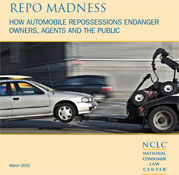3/17/2010
Report Warns Of Private Car Repo DangersNational Consumer Law Center report outlines concerns with private automobile seizure industry.

Private companies that repossess automobiles without the involvement of law enforcement are creating potentially deadly situations, a report released Thursday by the National Consumer Law Center (NCLC) warned. The Boston, Massachusetts-based non-profit legal advocacy group examined the consequences of turning car seizures over to private firms, particularly during the recent economic downturn.
"In just the past three years, the publicly reported toll from self-help repossessions is shocking," John W. Van Alst and Rick Jurgens wrote in the NCLC report. "Six deaths. Dozens of injuries and arrests. Pistols, rifles, shotguns, knives, fists and automobiles wielded as weapons. And, in at least three cases, repo agents towed away automobiles with children under the age of nine inside."
An estimated 1.9 million repossessions take place each year. In 33 states, no license or background check is required for the companies that repossess cars on behalf of lenders and car dealers. This means convicted felons can, and do, operate repo businesses.
The NCLC report takes issue with the practice of allowing a lender to unilaterally seize a car from its owner for missing a payment without first having a neutral third-party judge or administrative officer verify the claim.
"With the ability to repossess on a whim, dealers and lenders can use repossessions not simply as a means of retaking collateral when a debtor defaults," the report stated. "Lenders can also use the threat of repossession to intimidate consumers. For example, the prospect of having a car seized can be used to keep a consumer from asserting the right to withhold payment for a warranty violation or other breach of contract in the sale of the car or the right to revoke acceptance of a car with substantial defects."
The report cited court documents that showed one major repo company forced its agents to work up to 90 hours a week without overtime pay. "Each of you have the ability to do WHATEVER it takes to pick up more cars," an email sent to employees urged. Those who failed to meet a minimum weekly quota of twenty cars were forced to work longer hours. The pressure to take extreme actions in several cases has resulted in violence both against vehicle owners and the repo men themselves.
NCLC recommended that states adopt laws that require lenders to provide notice and provide car owners with a set period to remedy missed payments. It also recommended that lenders obtain a court order prior to seizing a vehicle. This, the group says, would allow motorists to have the opportunity to have a chance to challenge an improper seizure in a neutral setting. The report also urged that repo companies be licensed to prohibit the hiring of individuals with violent criminal histories.
A copy of the report is available in a 1.4mb PDF file at the source link below.


